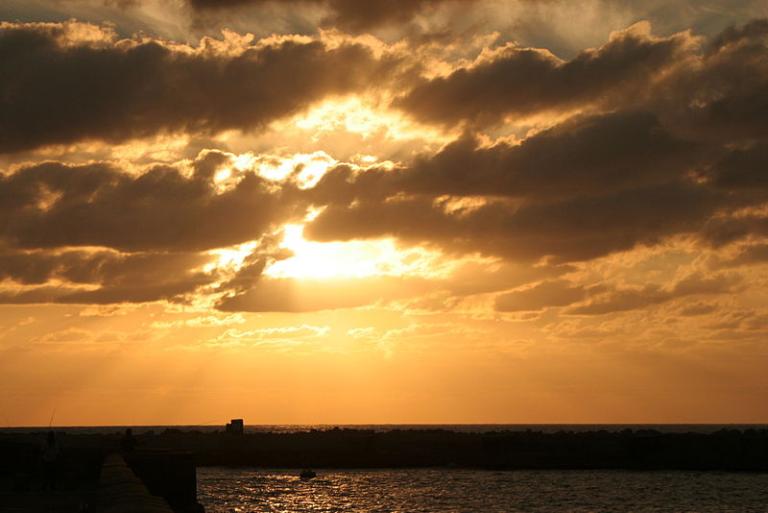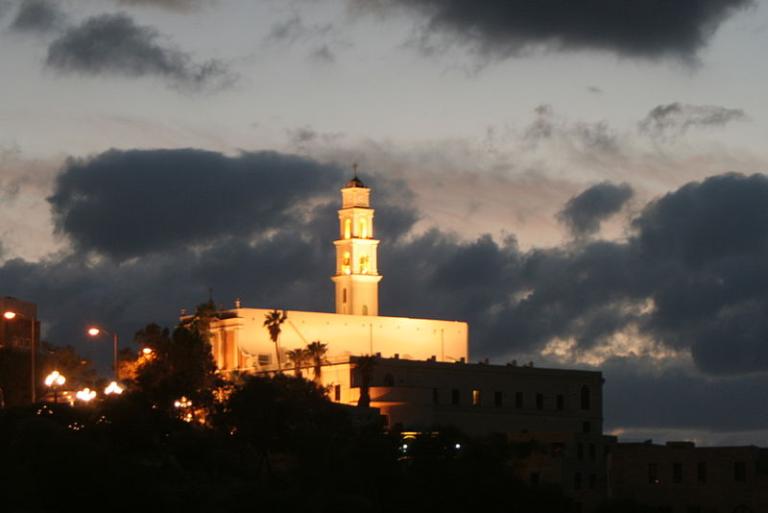
(Wikimedia Commons public domain image)
Well, we finally made it to Tel Aviv. About thirty hours late. We had time to put our luggage in our room, grab a quick bite to eat for dinner, and hold an orientation meeting with our group. Ten of them have arrived without their luggage; I hope that that problem can be remedied soon.
When they’re in a better position and can appreciate the humor of it all, perhaps I’ll tell them a trio of lost-luggage stories that I’ve enjoyed, involving people that I know. One of them is a personal experience of my own and it’s really short, so I’ll tell it — such as it is — right here:
Many years ago, my wife and I flew from New York City to Milan, Italy. Unfortunately, though, our bags did not. So I had to go downstairs at the Milan Malpensa Airport in order to file a lost-luggage report. When I arrived at the office, there was one person ahead of me who had also been on that flight and who was there, not looking very happy, to report that his bags hadn’t arrived. It was Henry Kissinger. Seeing him there cheered me up all day. Not because I had anything against Henry Kissinger but because it was amusing to see that such things can happen to the mighty and great as well as to peasants such as I. Our luggage landed on the next scheduled flight and was delivered to our hotel; I expect that Dr. Kissinger’s did, as well. (By the way, Henry Kissinger has just published a book on Leadership. It has received very positive reviews, and I want to read it. He is ninety-nine years old. Amazing.)
We’ve set the wake-up time for tomorrow morning at 5:45 AM. I always tell people that, after we’re done with them here, they’ll need a vacation from their vacation. I’m only partly joking.

(Wikimedia Commons public domain photograph)
I’m quite tired, and it’s already late here, so I’m going to reach back to something that I already posted some years ago:
Back in 2012, shortly after the (to me) unexpected and devastating death of my brother, my longtime friend Thomas F. Rogers was at our house for the monthly reading group to which he and I and our wives belonged — unfortunately, Tom’s wife has just recently passed away herself — and he brought with him a page of quotations that he thought might be helpful to me in my grief.
They were.
I was grateful to Tom, and I share them here in hopes that others, in whatever situation they may find themselves, might see special meaning in one or more of these:
The first is from Hugh B. Brown (1883-1975), an eloquent and well-beloved counselor in the First Presidency of the Church of Jesus Christ of Latter-day Saints during my formative years:
“Death,” said President Brown, “is not an extinguishing of the light. It is a putting out of the lamp because the dawn has come.” (Improvement Era [June 1967], 26)
That is an extraordinarily powerful comment.
The second comes from the distinguished Latter-day Saint historian Richard L. Bushman.
“The fact of the matter,” Professor Bushman writes, “is that I find goodness in my Latter-day Saint life that I find nowhere else. When my mind is filled with scripture, when I speak to the Lord in prayer, when I comport myself in the way of Jesus, I am the man I want to be. I feel wisdom, concentration, compassion, and comprehension to a degree beyond anything I have known as a scholar or a teacher. I do everything better under the influences that radiate from the Latter-day Saint religion. I am a better father and husband. I give more to my children. I connect with the poor and needy. I counsel my students more truly. I am more unselfish. Moreover, I like what the religion does for my fellow Saints, both longtime members and new converts. It welds us together into a community of mutual trust and aid. Latter-day Saints, in my experience, are people of goodwill. They give to each other and to worthy works of every kind. We care for each other the way Jesus said we should. The experiences in my own congregation have persuaded me that nothing is more likely to improve the world than conversion to the beliefs I have treasured all my life.
“As a scholar, I know full well the doubts of agnostics. I know that the scientific worldview, now dominant among intellectuals, appears to exclude traditional belief. I have dealt with the arguments against belief all my life. But over against these, I place my own intimate experience of goodness among the Latter-day Saints.” (Why I Believe [Salt Lake City: Bookcraft, 2002], 42)
My experience has been very much like his. I’m a better person, and life is better, when — to use a Latter-day Saint idiom — I’m in tune with the Spirit. My critics are unquestionably right, of course: I’m a horrifically bad person. But they should be grateful for the Church and its teachings because, otherwise, I would certainly be even worse.
The third is from a poem entitled “Finding Place,” which was written by the contemporary Latter-day Saint poet Doug Talley:
In this life we find the peaceable kingdom
within, then above, beneath, and all around.
What can a person driven by grandiosity
know of the quiet, hidden God found here?
Precisely.
(I hope that I’ve gotten the lines right.)
Posted from Tel Aviv, Israel










